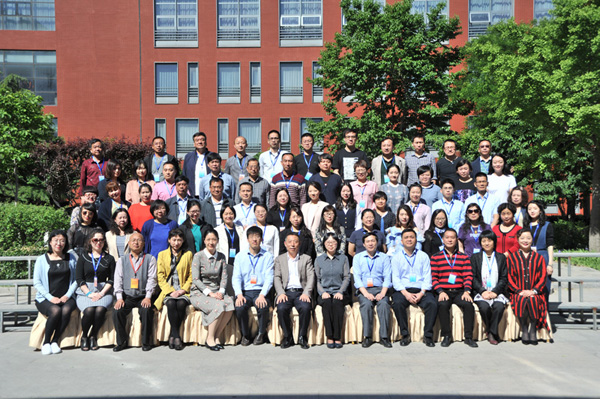 From 6-10 May 2019, the Open University of China (OUC) successfully held a training class, the second of its kind, for key teachers in elderly education.
From 6-10 May 2019, the Open University of China (OUC) successfully held a training class, the second of its kind, for key teachers in elderly education.

Liu Chen, deputy secretary of the Party Committee of the OUC; Zhang Weiyuan, professor of Beijing Normal University; Li Jing, director of the Institute of Ageing Society and Culture, China Research Centre on Ageing; Li Zhihong, director of the Policy Research Department of the China Ageing Association; Wu Xiang, director of the Education Department of the National Bureau of Statistics and vice president of the University for the Elderly; Ye Biao, chief architect of Beijing Yihe Renwen Kaiyuan Architecture Design Firm; Wen Shuyu, director of the Office of Career Development and General Management of the OUC Open University for Older Adults; and Tao Dinghong, dean of the OUC’s Beijing School for the Elderly, attended the training class, which was also attended by 70 senior educators from open universities or Radio and TV Universities (RTVUs) from various provinces and cities.
Deputy secretary Liu Chen attended the meeting and delivered a speech. According to Liu Chen, the OUC Open University for Older Adults was officially launched on 28 January 2015. Through more than four years of exploration and practice, the construction of the system and majors, the promotion of non-degree education and training projects, and the construction of information and teaching content have been carried out in an orderly manner and a good development trend has emerged.
Liu Chen emphasised that the system of open universities (or RTVUs) should be unified, work together, adhere to the new concept of running a university for the elderly, promote the development of Open University for the elderly, focus on elderly education and the service industry for the elderly, prioritise the development of distance education for the elderly, actively promote the construction of a new system of distance education for the elderly and senior service practitioners, further promote the integration of elderly care and support with education and the realisation of innovation and the sustainable development of education for the elderly, and develop education for the elderly as an important part of the OUC and its organisational system in the construction of a lifelong education system and the formation of a learning society that promotes lifelong learning for all the people. It should provide a platform and services for the elderly and elderly service practitioners to receive continuing education and sustainable self-learning, and create a new pattern of distance education for the elderly.
Experts and scholars in the field of elderly education gave themed reports to and exchanged experiences with the participants of the seminar with regards to innovations in the practice of elderly education in the Internet age, the ageing situation and the development of elderly education in the new era, diversified elderly education in the context of an ageing society, and the development of educational undertakings with lifelong education as the core by means of tourism, learning, and elderly care.
Experts believe that elderly education in the Internet age needs to innovate by determining the status and role of elderly education, promoting the modernisation of elderly education, establishing a ladder for the development and service of the elderly, establishing an "Internet +" ecosphere for elderly education, and strengthening research into elderly education in the Internet age. Elderly education has dual goals for individuals and society as well. There are obvious demands for education related to retirement, health care, leisure, knowledge and skills, and life and death. The educational needs of elderly people are also diverse, with many different educational needs intersecting with each other, of which health care, leisure and entertainment, knowledge and skills education rank first. The educational needs of elderly people have been affected by many factors and thus will display many differences.
Experts commented that at present, elderly people in China generally hold a positive attitude towards participating in educational activities. They hope to promote physical and mental health, satisfy personal interests and hobbies, expand interpersonal contacts, maintain social contacts, make up for educational regrets, and realise self-value by participating in elderly education. In order to promote the development of education for the aged, we should make full use of social forces, carry out promotion and training, change our ideological understanding, and enhance the participation consciousness of the elderly. We should increase investment, improve school-running conditions, and improve the level of running universities for the aged; improve relevant policies and clarify the development direction; and realise resource sharing and encourage members of society to join in school running.
During the exchange and sharing of experiences and projects, educators engaging in education for the elderly from seven local RTVUs, including the OUC Open University for Older Adults, Qingdao RTVU, the Open University of Guangdong, Heilongjiang RTVU, Chengdu RTVU, Xi'an RTVU, the OUC Taiyuan Experimental School, and Hunan RTVU, shared their experiences in elderly education and related projects with the participants of the seminar.
By Qishuang,OUC